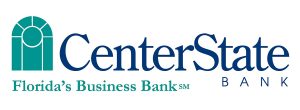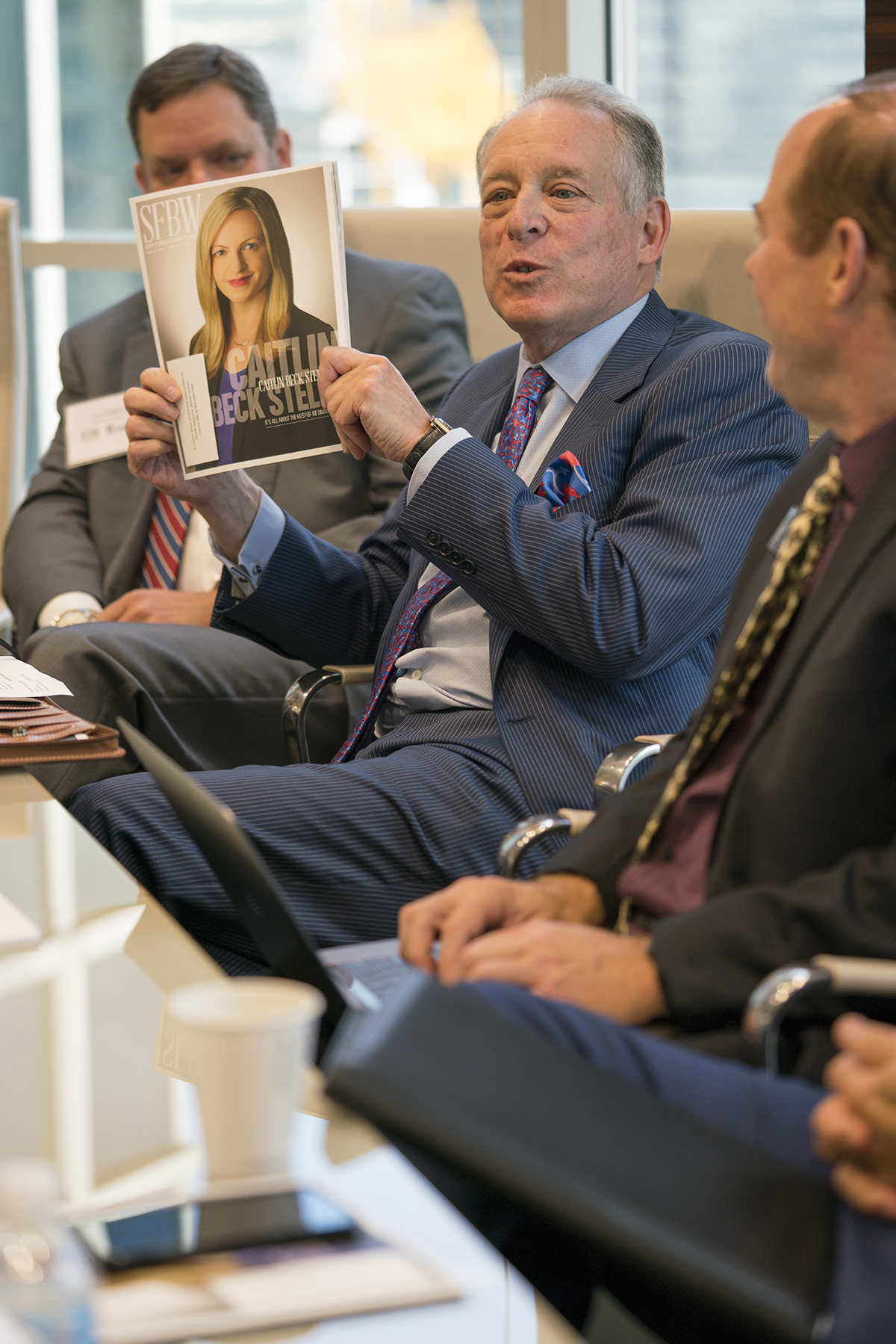[vc_row css_animation=”” row_type=”row” use_row_as_full_screen_section=”no” type=”full_width” angled_section=”no” text_align=”left” background_image_as_pattern=”without_pattern”][vc_column width=”2/3″][vc_column_text]
POWERED BY

SFBW convened some of the region’s top accounting firm members to discuss industry trends and new ways of helping clients. Myriad consulting services and the use of technology, such as artificial intelligence, are propelling change in the field—and helping clients be more efficient and profitable.
The roundtable was held at the Fort Lauderdale office of CenterState Bank and moderated by SFBW Editor-in-Chief Kevin Gale. Here are edited highlights of the conversation.
The panelists
• Stewart L. Appelrouth, co-founder and partner, Appelrouth & Farah & Co.
• Louis Balbirer, taxes services principal and technology industry group leader, Kaufman Rossin.
• Edward N. Cooper, director in charge of tax services, Berkowitz Pollack Brant.
• Joey Epstein, principal and South Florida business development leader, MBAF.
• Mark Giallonardo, tax services principal, Cherry Bekaert.
• Barry Gould, South Florida partner in charge, EisnerAmper.
• Teri M. Kaye, partner in charge, Daskzal Bolton’s Fort Lauderdale area office.
• Jose Lamela Jr., partner, Crowe.
• Thomas J. Longman, CEO of Longman WealthCare Management.
• Kimberly A. Randolph, managing director and tax practice leader, Boca Raton, CBIZ.
• Irene Salum, director, Fuoco Group.
• Michael Torres, partner and founding member, PAAST.
Consulting is the growth engine
Salum: Audits and taxes? Anybody can do it. It has become a commodity. I don’t have clients coming in and saying, “I really want that audit done.” It’s about giving more value: “The business hasn’t grown for five years—how can you help us?” Clients are looking for intelligence and experience to give ideas. They might say, “How do I pay less in taxes?” They want us as a partner.
Gould: We have spent a ton of time focusing on the consulting side of the practice. We have brought in and hired other nontraditional hires to offer cybersecurity solutions, outsourcing, and we have a very large automation program group. Everyone is using technology to make mundane processes faster and more effective.
Cooper: We are looking at implementing a lot of technology opportunities for people to run their business better. Clients are sometimes looking to outsource bookkeeping, the whole accounting process, or CFO functions.
Longman: About 20 years ago, I had enough of audit. I had a vision and decided to make an area of expertise in qualified pension plans. The tax law was a perfect fit for us. A lot of clients want to put away money for retirement. I hang out with actuaries and large third-party administrators every day.
Lamela: One of the reasons we opened up the Miami office five years ago is, we get a lot of referrals from our national network. And a lot of times, it’s foreign companies or high net worth individuals, sets of companies, that want to come into United States. We are introducing them to banks, because, when they come in, they have no banking relationship. They want to make an acquisition of a business, so we’re introducing them to advisory people to help them identify potential businesses that they can buy. They also don’t know any insurance agents. We are kind of like the relationship person who introduces them to all of these different players in the community.
Appelrouth: Consultancy is the way to go in the future with artificial intelligence coming into play. The clients are looking for brain power. At our firm, we’re hiring more experienced people, diversified people from other areas that have business acumen. The clients are telling us to have diversified knowledge—knowledge of insurance, automation, computerization, just plain finance and health care to take care of everyone’s needs.
Giallonardo: We are really focusing on becoming more of a consultative practice, and we recognize, as compliance work becomes more of a commodity, we really are trying to drive costs out of that part of our practice. At the same time, we’ve made major investments on the consulting side. We have consultants that have the ability to do a lot of mergers and acquisitions valuation work. We made major investments in the IT side, so we have IT consulting services that we that we offer, and cybersecurity as well.
Kaye: Daszkal Bolton has always had the philosophy of offering advisory and consultancy, and obviously the industry trend is that way. Compliance is a must at this point. We have folks that have been business advisers in various specialized industries for years, and we continue that trend. Our most recent hire was somebody that has a medical and health care operations consultancy practice. So, we’re extending that to all of our health care clients.
We have clients all over the world through our AGN International affiliation. [AGN is an association of international accounting and consultancy firms.] Our breath and depth are more than just South Florida as a result of that affiliation and the professionals that we have access to.
Giallonardo: It’s less compliance and we have to be consultative. I think my aha! moment was probably five-plus years ago. I was at a conference and the speaker mentioned IBM’s Watson— back then it was, who’s that? They actually gave a quick example about a case study involving an issue that was going to some law firms in New York. It took weeks. One was wrong and the other was correct. Watson came up with the correct conclusion in a matter of minutes. I had a panic attack that professionals would be dinosaurs, then the realization hit that we’re still needed and maybe needed more now, because that data mining will be more efficient and quicker, but our clients still need us to interpret it, implement it, maintain it and be nimbler about it. In our firm, the biggest growing service line is IT.
Randolph: We’ve always strived to be our clients’ business consultants and their trusted adviser that is doing the planning and the consulting and not just the compliance. It’s really being at the table listening for their needs, whether it’s helping them with cash-flow planning, CFO services, HR services, consulting, risk advisory. We’ve done a ton of investment in our people and training at the earlier levels and kids coming out of school, because they don’t teach it necessarily in the classroom.
Balbirer: It’s hard to disagree with anything that was said. I think you even have it down into traditional services. Even within the tax function, which is where I practice, there’s a huge need to grow full-service tax consultants. The tax law continues to get more complex, just look at the last Tax Act. Anybody that said it was simplifying tax law didn’t read it. There is a huge need for folks who are really diving deep to understand the tax code, understand the relevant authority and who can speak to clients at a level that they understand and help them make business decisions. Every business decision they make typically has a tax consequence, and so whether it’s choice of entity or navigating the QBID [qualified business income deduction] rules, or opportunity zones, or whatever it happens to be, there’s so much opportunity there.
Epstein: I was the chairman of the Florida Institute of Certified Public Accountants two years ago, and I still sit on a CPA council representing Florida. We’ve been talking about all these things for years. Historically, we’ve had junior staff accountants go out and pull a sample of transactions for the year—very small samples to help support an audit opinion, which takes days. Artificial intelligence is going to test 100 percent of the company transactions in about 10 minutes. So, the issue is going to be what do we do about staff, training staff, keeping the staff up to date?
Biggest Opportunities
with New Clients
Stewart: Believe it or not, one of the biggest things is cash management. Cash flow is critical to small and midsized companies. We are also back to talking about AI where inventory, in the old days, you would look at what’s good and bad, what I need and what’s selling. With AI today, they can relieve themselves of most of that responsibility. They want assistance with personnel, which is a new area for accountants—helping them staff their own business.
Epstein: I think most clients today, especially the middle market, are really looking for value for the fees that they’re paying us, and they may be looking for us more to help them grow their business. That may include some savings, but I think they look to us more for consulting again to help them grow their business, not necessarily to kind of save a few dollars here and there.
Kaye: I look at tax returns that are done from prior years. I’m a tax professional, so that’s the starting point. Have they had a cost segregation study? Or has an R&D study been considered and would that be appropriate? If they have capital gains, can they understand what an opportunity zone can do? Have they optimized all the things that they can optimize in the tax returns? And if they haven’t, we have opportunities to amend prior years and get their own dollars back for them, which they love. And at the same time, it’s making sure that I really understand the following: What are their assets? What are their operations? What have they gone through to get where they are? And where do they want to go? Because with that set of information, I can provide value to help them get there.
Lamela: It depends on where they are in the business cycle. Some businesses are mature, but the owners are not thinking, ‘How do I monetize this?’ The structure can have a huge impact. It’s more thinking of how you can bring value to the long term. That’s a huge one that could be millions and millions of dollars of potential savings. How do you help them structure that efficiently toward eventually monetizing? Others just want to expand internationally or more into other states. You need subject matter experts there.
Epstein: Sometimes we’ll go in and it will actually cost the client more money for the things they weren’t doing properly. They’re not filing in states and you’re supposed to do income tax returns, sales taxes. There’s many, many clients in the middle market that are not in compliance.
Torres: More and more clients are using Amazon fulfillment. Amazon has the right to move inventory to any state they want. It creates a nexus. A lot of clients don’t know they have a state sales tax liability. Every state has a different rule.
Gould: In addition to looking at their business coming in from the beginning, we’re also looking at the whole family and figuring out how the business relates to the family and how profits can be split between family members, ultimately getting into their entire estate plan. It may cost more money up front. You may have to bring a new estate attorney and outside consultants.
We had a consultant come in our firm a few years ago—we bought her company.
We created the Center for Family Business Excellence, and she’s a consultant, not a CPA. Her entire job is to go talk to family-owned businesses to deal with the next generation planning. She’s busy flying all over the country.
Cooper: I think one of the opportunities is identifying and helping the client understand when their business has outgrown their processes and their infrastructure. There’s a lot of businesses that have a QuickBooks platform, and that’s just not scalable. A lot of times, what happens is the people in their organization are not pushing for change, because they don’t want to change. So, we’re having those hard discussions with the client about looking at different alternatives on to how to run their business and dealing with the pushback that you get from the trusted advisers inside the organization that are afraid to try something different. ♦
[/vc_column_text][/vc_column][vc_column width=”1/3″][vc_gallery interval=”3″ images=”30431,30430,30429,30428,30427,30426,30425,30424″ img_size=”full” onclick=”img_link_large” show_image_description=”yes”][/vc_column][/vc_row]













